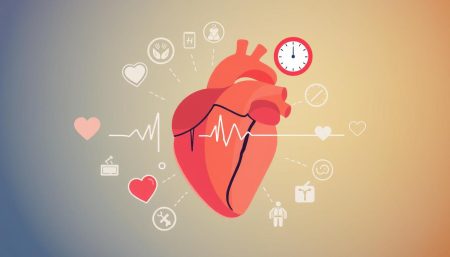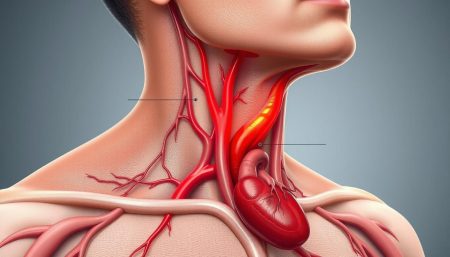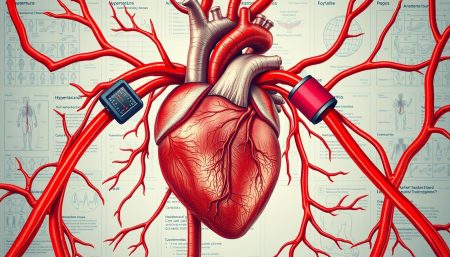Cardiovascular disease affects millions of lives worldwide. This guide sheds light on the various factors that can lead to heart problems. Understanding these risks is key to maintaining a healthy heart and preventing serious complications.
Many elements play a role in developing heart disease. Lifestyle choices and genetic predisposition are among them. We’ll explore common causes of coronary artery disease and provide insights on how to reduce your risk.
By the end, you’ll have a clearer picture of what impacts heart health. You’ll also know steps you can take to protect yourself.
Understanding Cardiovascular Disease: A Comprehensive Overview
Cardiovascular disease affects millions globally, impacting the heart and blood vessels. This overview covers common types, global statistics, and early warning signs. It helps you spot heart issues early.
Common Types of Heart Disease
Heart disease includes many conditions. Coronary artery disease often results from atherosclerosis. This narrows arteries, reducing blood flow to the heart. Other types include heart valve problems, arrhythmias, and heart failure.
Global Impact and Statistics
Cardiovascular disease is a top cause of death worldwide. In the United States, it kills over 650,000 people each year. High blood pressure is a big contributor, affecting 1 in 3 adults globally.
| Region | CVD Deaths (% of total deaths) | Prevalence of High Blood Pressure |
|---|---|---|
| North America | 31% | 28% |
| Europe | 45% | 33% |
| Asia | 35% | 27% |
Early Warning Signs and Symptoms
Spotting heart disease early is key. Common symptoms include:
- Chest pain or discomfort
- Shortness of breath
- Irregular heartbeat
- Fatigue
- Swelling in legs, ankles, or feet
Knowing these symptoms and risk factors like atherosclerosis and high blood pressure can help. It leads to early treatment and better heart health.
How Can You Get Cardiovascular Disease: Main Risk Factors
It’s important to know about heart disease risk factors to keep your heart healthy. These factors fall into two groups: things you can control and things you can’t.
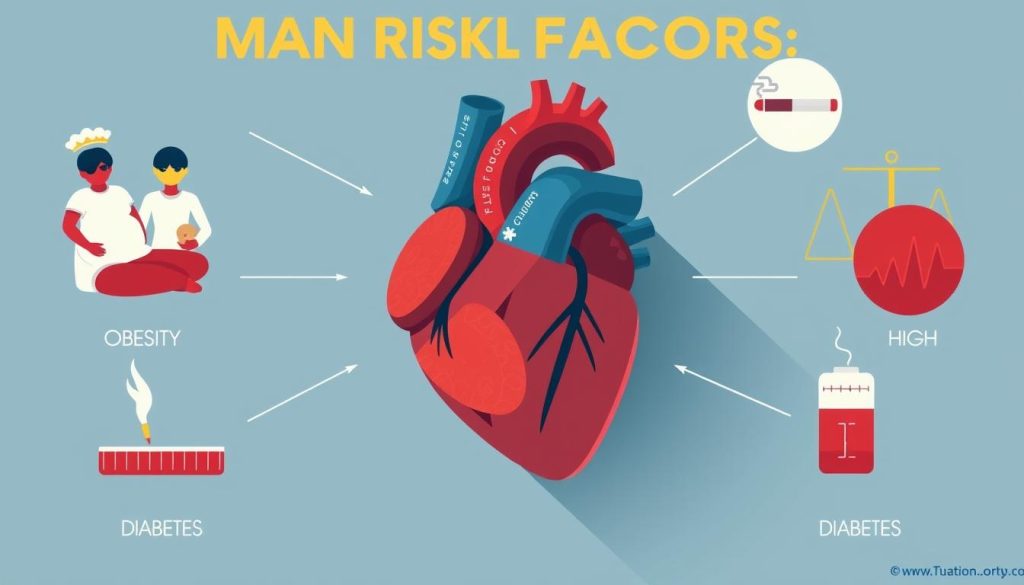
Family history is a big factor in heart disease risk. If your parents or siblings had heart issues, you might be at higher risk. Even though you can’t change your genes, knowing your family history helps you take action.
Unhealthy lifestyle choices also play a big role in heart disease. These include:
- Smoking or using tobacco products
- Lack of regular physical activity
- Poor diet high in saturated fats and processed foods
- Excessive alcohol consumption
Other risk factors include high blood pressure, high cholesterol, and diabetes. These often come from a mix of genes and lifestyle choices.
Age and gender also affect heart disease risk. Men are usually at higher risk than women, and risk increases with age for both. After menopause, women’s risk becomes similar to men’s.
“Prevention is better than cure. Knowing your risk factors is the first step towards a healthier heart.”
Understanding heart disease risk factors helps you make better health choices. While some risks are beyond your control, many can be managed through lifestyle changes and medical care when needed.
Genetic Predisposition and Family History Impact
Your genes are key in figuring out your heart disease risk. Doctors look at your family history to check your heart health. Knowing your genes can help you protect your heart.
Inherited Heart Conditions
Some heart issues run in families. These include:
- Hypertrophic cardiomyopathy
- Familial hypercholesterolemia
- Long QT syndrome
If a close relative has one of these, your risk might be higher. Talk about your family history with your doctor.

DNA Testing for Heart Disease Risk
Genetic tests can show your heart disease risk. They look for genes linked to heart problems. They’re not 100% sure, but they help plan prevention and early care.
Managing Genetic Risk Factors
Even with a genetic risk, you can lower it:
- Eat healthy and exercise often
- Don’t smoke and drink less alcohol
- Keep an eye on your blood pressure and cholesterol
- Use stress-relief methods
Genetics is just one part. Your lifestyle choices are also key to heart health. By knowing your genetic risk and making good choices, you can control your heart health.
Lifestyle Habits Contributing to Heart Disease
Our daily choices greatly affect our heart health. Bad habits can raise the risk of heart disease. Knowing these risks helps us make better choices for our heart.
Smoking is very bad for the heart. It harms blood vessels and lowers blood oxygen. Quitting smoking is a big step towards better heart health.
Being overweight also harms the heart. Extra weight strains the heart and can cause high blood pressure and diabetes. Eating right and exercising helps keep the heart healthy.
- Poor diet high in saturated fats, sugar, and salt
- Lack of physical activity
- Excessive alcohol consumption
- Chronic stress and inadequate sleep
These bad habits often go together, making heart disease risk worse. For instance, not moving much and eating poorly can lead to obesity. This makes heart disease risk even higher.
“The good news is that many of these risk factors are within our control. Small, consistent changes in our daily habits can make a big difference in protecting our hearts.”
By changing these unhealthy habits, we can lower heart disease risk. It’s always a good time to start making heart-healthy choices.
The Role of Diet in Cardiovascular Health
Your diet is very important for your heart health. Bad eating habits can lead to obesity and heart problems. It’s key to know how food affects your heart.

High-Risk Dietary Patterns
Some eating habits can raise your heart disease risk. These include:
- High intake of saturated and trans fats
- Excessive consumption of processed foods
- Diets high in added sugars
- Regular consumption of red and processed meats
Heart-Healthy Food Choices
Choosing a heart-healthy diet can lower your heart disease risk. Focus on:
- Fruits and vegetables
- Whole grains
- Lean proteins (fish, poultry, legumes)
- Healthy fats (olive oil, avocados, nuts)
Impact of Sodium and Processed Foods
Too much sodium and processed foods can harm your heart. High sodium can increase blood pressure, a big heart disease risk. Processed foods often have hidden sodium, unhealthy fats, and sugars. To keep your heart safe:
- Limit sodium to less than 2,300 mg per day
- Read food labels carefully
- Choose fresh, whole foods over processed options
By making smart food choices, you can greatly improve your heart health. This can also lower the risk of heart disease linked to obesity and unhealthy habits.
Physical Inactivity and Its Effects on Heart Health
Unhealthy lifestyle habits harm heart health. Physical inactivity is a big risk for heart disease. Many Americans sit too much, hurting their hearts.
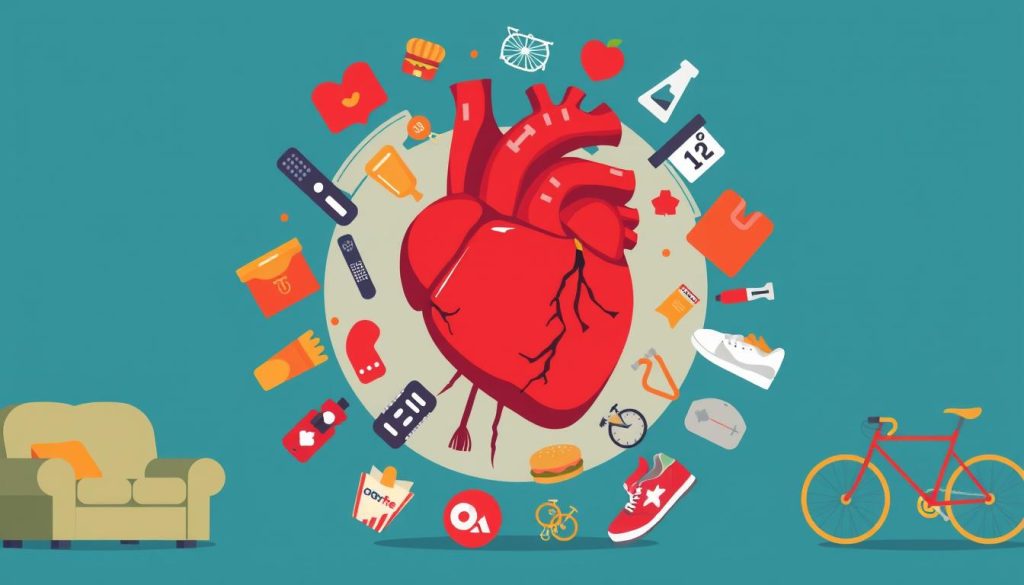
Not exercising leads to obesity and heart issues. Our bodies can’t handle blood sugar, pressure, and cholesterol without movement. This causes artery blockages, raising heart attack and stroke risks.
Exercise keeps weight in check and strengthens the heart. It improves blood flow, lowers blood pressure, and raises good cholesterol. Even simple activities like brisk walking for 30 minutes daily can help a lot.
“Exercise is medicine for the heart. It’s never too late to start moving and reap the benefits for your cardiovascular health.”
To fight physical inactivity:
- Find activities you enjoy
- Set realistic goals
- Incorporate movement into daily routines
- Gradually increase intensity and duration
Small changes can greatly improve heart health. By making exercise a priority, we can lower heart disease risk and live a healthier, more active life.
| Activity Level | Heart Disease Risk | Recommended Daily Activity |
|---|---|---|
| Sedentary | High | Start with 10-15 minutes of walking |
| Moderately Active | Medium | 30 minutes of moderate exercise |
| Very Active | Low | 60+ minutes of varied exercises |
Smoking and Tobacco Use: Direct Path to Heart Disease
Smoking and heart disease are closely linked, forming a dangerous connection that severely impacts cardiovascular health. This unhealthy lifestyle habit remains a leading cause of preventable deaths worldwide.
Nicotine’s Impact on Blood Vessels
Nicotine, the addictive substance in tobacco, wreaks havoc on your blood vessels. It causes them to narrow and harden, reducing blood flow to vital organs. This process, known as atherosclerosis, significantly increases the risk of heart attacks and strokes.

Secondhand Smoke Risks
The dangers of smoking extend beyond the smoker. Secondhand smoke exposure can be just as harmful. Non-smokers living or working with smokers face an increased risk of heart disease, highlighting the far-reaching effects of this unhealthy habit.
Quitting Benefits for Heart Health
The good news is that quitting smoking can rapidly improve heart health. Within just one year of quitting, your risk of heart disease drops by half. This dramatic improvement shows how quitting is key to managing heart health.
| Time After Quitting | Heart Health Benefit |
|---|---|
| 20 minutes | Heart rate and blood pressure drop |
| 12 hours | Carbon monoxide level in blood drops to normal |
| 1-9 months | Coughing and shortness of breath decrease |
| 1 year | Risk of coronary heart disease is half that of a smoker |
| 5 years | Stroke risk is reduced to that of a non-smoker |
By understanding the link between smoking and heart disease, individuals can make informed decisions about their health. Quitting smoking is a key step in adopting a heart-healthy lifestyle and reducing cardiovascular risk.
High Blood Pressure and Cholesterol Management
High blood pressure and high cholesterol are major risks for heart disease. They can cause serious heart problems if not managed. It’s important to understand their impact and how to control them to keep your heart healthy.
Blood pressure is the force blood pushes against artery walls. High blood pressure can damage these walls, leading to atherosclerosis. This condition makes arteries narrow, reducing blood flow and increasing the risk of heart attacks and strokes.
Cholesterol is a waxy substance in the blood that’s vital for cell function. But too much can clog arteries, forming plaques. This further narrows blood vessels, making the high blood pressure effects worse for the heart.
“Managing blood pressure and cholesterol is like giving your heart a shield against disease.”
Effective management strategies include:
- Regular blood pressure and cholesterol checks
- Adopting a heart-healthy diet low in saturated fats and sodium
- Engaging in regular physical activity
- Maintaining a healthy weight
- Quitting smoking
- Taking prescribed medications as directed
By tackling these factors, you can greatly lower your risk of heart disease and improve your heart health.
| Risk Factor | Normal Range | High Risk Range | Management Tips |
|---|---|---|---|
| Blood Pressure | Below 120/80 mmHg | 140/90 mmHg or higher | Reduce salt intake, exercise regularly |
| Total Cholesterol | Below 200 mg/dL | 240 mg/dL or higher | Eat more fiber, limit saturated fats |
| LDL Cholesterol | Below 100 mg/dL | 160 mg/dL or higher | Increase omega-3 intake, avoid trans fats |
Obesity’s Connection to Cardiovascular Problems
Carrying extra weight is hard on your heart. Obesity is a major risk factor for heart disease. It’s important to know how weight affects your heart health and what you can do.
Body Mass Index and Heart Risk
Your Body Mass Index (BMI) is more than a number. Doctors use it to check your heart disease risk. A higher BMI means a greater risk of heart problems.
Extra weight puts more pressure on your heart. This can lead to higher blood pressure and cholesterol levels.
Metabolic Syndrome Factors
Obesity is linked to metabolic syndrome, a group of conditions that increase heart disease risk. These include high blood sugar, high blood pressure, and abnormal cholesterol levels. Together, they can cause serious heart issues.
Weight Management Strategies
Managing your weight is key to heart health. Small changes can have a big impact. Eating a balanced diet and exercising regularly can help.
Start with simple steps like walking for 30 minutes a day. It’s about making lasting changes for a healthier heart.
FAQ
Q: What are the main risk factors for cardiovascular disease?
A: High blood pressure, high cholesterol, and smoking are big risks. Obesity, not moving enough, and eating poorly also matter. Family history and age play a role too. Some risks you can change, but others you can’t.
Q: How does atherosclerosis develop and contribute to heart disease?
A: Atherosclerosis happens when plaque builds up in arteries. This narrows and hardens them. It blocks blood flow to the heart and other organs, leading to heart attacks and other problems.
Q: What are the effects of high blood pressure on cardiovascular health?
A: High blood pressure stresses the heart and blood vessels. It can cause arteries to thicken, raising the risk of heart attacks and strokes. It can also make the heart bigger and weaker, leading to heart failure.
Q: How does smoking contribute to heart disease?
A: Smoking damages blood vessels and lowers oxygen in the blood. It increases the risk of blood clots and raises blood pressure and heart rate. These effects greatly increase the risk of heart disease and strokes.
Q: Can family history increase my risk of cardiovascular disease?
A: Yes, family history can raise your risk. If your parents or siblings had heart disease early, you might be at higher risk. It doesn’t mean you’ll definitely get heart disease, but it’s a warning to manage your risk factors.
Q: How does obesity affect heart health?
A: Obesity increases the risk of high blood pressure, high cholesterol, and diabetes. It can also cause inflammation and metabolic changes that strain the heart. Losing weight through diet and exercise is key for heart health.
Q: What role does stress play in cardiovascular disease?
A: Chronic stress can lead to high blood pressure, increased heart rate, and inflammation. It can also lead to unhealthy behaviors like overeating and smoking. Managing stress is important for heart health.
Q: How can I prevent or reduce my risk of cardiovascular disease?
A: To lower your risk, live a heart-healthy lifestyle. Eat well, exercise, manage stress, avoid smoking, and drink less alcohol. Keep your weight healthy. Regular check-ups are also important to monitor your health.












